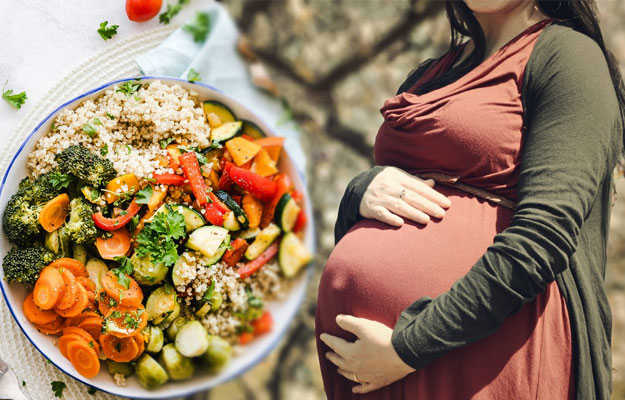Pregnant women who have never had diabetes before but who have high blood glucose (sugar) levels during pregnancy are said to have gestational diabetes.
The placenta supports the baby as it grows and hormones from the placenta help the baby develop. But these hormones also block the action of the mother's insulin in her body. This is called insulin resistance. Insulin resistance makes it hard for the mother's body to use insulin. She may need up to three times as much insulin in such cases. Gestational diabetes starts when your body is not able to make and use all the insulin it needs. Without enough insulin, glucose cannot leave the blood and be changed to energy. it builds up in the blood and reaches high levels. This is called hyperglycemia.
Here is the complete detail about how to treat diabetes.
If you have gestational diabetes, you should consult your doctor at every step and monitor your symptoms and condition closely. Your doctor may recommend some dietary interventions that can help manage your condition over the next few months. In this article, we explore what some of those interventions could be.
(Read more: Blood sugar test)
- Gestational diabetes diet: Which foods to eat
- Fruits for gestational diabetes
- Vegetables for gestational diabetes
- Gestational diabetes diet: Foods to avoid
- Diet plan for gestational diabetes
Gestational diabetes diet: Which foods to eat
The treatment of diabetes during pregnancy may involve lifestyle modification (LSM) alone or a combination of LSM and insulin therapy. Lifestyle modification includes dietary modifications and regular physical activity in the form of daily walks. Dietary modifications have a major role to play in controlling your blood sugar. The following are some diet changes you might be in need of if you have gestational diabetes:
(Read more: Insulin Test)
Have small and frequent meals: Large meals after a long gap can increase your blood sugar. In this situation, you need to take small meals at frequent intervals of three hours rather than having three major meals only. Plan your day with breakfast, lunch and dinner as well as three small meals in between like mid-meal snacks and a bedtime snack.
(Read More - Diabetic Dyslipidemia treatment)
Include protein for slow absorption of glucose: Protein absorbs slowly as compared to carbohydrates, which helps control your blood sugar. So try to include protein along with carbs. Good protein sources include milk, meat, eggs and fish. Protein can also be obtained from pulses, soybean, groundnuts, etc. You can have many carbohydrate and protein combination meals such as dal and chapati, daliya khichdi, brown rice chapati, chapati with wheat and besan, scrambled egg with chapati, etc.
(Read More - Diabetic Gastroparesis treatment)
Meet your iron requirements: Due to increased blood requirement, low hemoglobin level (hemoglobin deficiency) is very common during the pregnancy, and iron is one of the nutrients that is responsible for that. To meet the additional iron needs of your body, whole grain cereals, whole pulses, some leafy vegetables like mustard leaves and bathua, dried fruits like almonds and walnuts, dates, egg yolk and organ meat can be consumed.
(Read More - Homeopathic treatment for Diabetes)
Have a calcium-rich diet: Calcium is an essential nutrient during pregnancy. Additional calcium is required for the growth and development of the bones of the fetus. Calcium-rich sources include milk, dairy products, pulses, soybean, egg, etc. For better absorption of calcium, check your vitamin D levels and speak to your doctor about supplementation if required.
(Read More - Diabetes Insipidus treatment)
Increase fiber consumption for constipation: During pregnancy, due to fetal pressure, constipation can become a common problem. Therefore, foods rich in fiber like fresh fruits and vegetables, whole grain cereals and whole pulses should be consumed along with plenty of fluids. An intake of about 40 gm of fiber is recommended daily.
(Read More - Glucose Tolerance Test)
Judge your carbs correctly: Most of the carbohydrates should be given in the complex form rather than simple sugars as they break down more slowly to release glucose. The presence of fiber increases intestinal transit time, delays gastric emptying time and slows glucose absorption. Soluble fiber present in oats, barley, fruits and legumes has been shown to reduce blood sugar levels.
(Read More - Diabetic Ketoacidosis treatment)
Turn to low glycemic index foods: Choosing low glycaemic index (GI) foods may help manage your blood sugar levels. GI is a measure of how quickly foods containing carbs affect your blood sugar levels after you eat them. While some foods affect sugar levels quickly and so they have a high GI, others take longer to affect blood sugar levels and so they have a low GI.
You can benefit by switching to lower GI foods whenever possible and choosing some healthier carbs. Some of these foods include rajma, lentils, apples, oranges, methi, spinach, barley, oats, buckwheat (kuttu) etc.
(Read More - Glucose Challenge Test)
Fruits for gestational diabetes
Choose low GI and high fiber fruits. Fruits are the best food options for snacks but combining fruits with your big meals can increase your blood sugar levels. So try to have whole fruits (not juice) at snack time. You can include apples, pear, oranges, muskmelon and sweet lime in your diet. You can discuss quantities with your nutritionist.
(Read More - Exercises for Diabetes)
Vegetables for gestational diabetes
Vegetables are a good source of water, fiber, iron, zinc and much more. Adding one vegetable in every meal can help you control your blood sugar. You can have soup, stir fry, salad, stew or cooked vegetables to add to this food group in your diet. As starchy vegetables have high carbohydrate content, try to avoid them. You can have spinach, fenugreek leaves, amaranth, sponge gourd, bottle gourd, brinjal, tomato and drumsticks on a regular basis.
(Read More - Diabetes diet)
Gestational diabetes diet: Foods to avoid
Some food can worsen your blood sugar levels, which can be harmful for the mother and the fetus as well. Following are some such foods that should be avoided -
- Simple carbohydrates: Fruit Juices, all-purpose flour, bakery products, sugar, honey and jaggery
- Fried foods: Samosas, kachoris and pakoras
- Processed foods: Jam, jelly, chips, namkeen, biscuits and breakfast cereals
- Food rich in Ajinomoto: Chinese food and ready-to-eat foods
- Junk food: Pizzas, burgers and french fries
(Read More - Gestational Diabetes Diet)
Diet plan for gestational diabetes
Following is a sample daily diet that you can use as a guide to design your diet plan:
- Early morning: Low fat milk (1 cup) + soaked almond and walnut (8+4)
- Breakfast: Paneer stuffed besan cheela (2) + green chutney
- Mid Meal: Apple (1 small sized)
- Lunch: Vegetable salad (15-30 minutes before your meal) + millet chapati (2) + toor dal (1 bowl) + bottle gourd curry (1 bowl) + Cucumber raita (1 bowl)
- Evening tea: Tea (1 cup) + roasted makhanas (1 bowl)
- Dinner: Vegetable soup (1 big bowl, 30-45 minutes before dinner) + besan chapati (2) + paneer and vegetable curry (6-7 pieces)
- Bedtime: Badam milk (1 glass)
(Read More - Gestational Diabetes)
Find Nutritionist in cities
Doctors for Gestational Diabetes Diet and Diet Plan

Dr. Dhanamjaya D
Nutritionist
16 Years of Experience

Dt. Surbhi Upadhyay
Nutritionist
3 Years of Experience

Dt. Manjari Purwar
Nutritionist
11 Years of Experience

Dt. Akanksha Mishra
Nutritionist
8 Years of Experience
References
- Farabi Sarah S., Hernandez Teri L. Low-Carbohydrate Diets for Gestational Diabetes. Nutrients. 2019 Aug; 11(8): 1737. PMID: 31357598.
- Alfadhli Eman M. Gestational diabetes mellitus. Saudi Med J. 2015; 36(4): 399–406. PMID: 25828275.
- Hernandez Teri L., Anderson Molly A., Chartier-Logan Catherine, Friedman Jacob E., Barbour Linda A. Strategies in the Nutritional Management of Gestational Diabetes. Clin Obstet Gynecol. 2013 Dec; 56(4): 803–815. PMID: 24047934.
- Diabetes UK What can i eat with gestational diabetes?. The British Diabetic Association. London; What can i eat with gestational diabetes?.
- Han Shanshan, Middleton Philippa, Shepherd Emily, Ryswyk Emer Van, Crowther Caroline A. Different types of dietary advice for women with gestational diabetes mellitus. Cochrane Database Syst Rev. 2017 Feb 25;2(2):CD009275. PMID: 28236296.

































